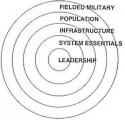... "In my 33 years in the military, I have never seen tougher terrain than here," says the general, who adds that the "vast majority of the country" is now secure. "There are about five or six provinces that have significant security challenges and they are primarily in rural areas." Translation: Kabul and major cities are calm, but in the southern and eastern provinces, where the government hasn't established its authority, violence prevails.
In some regions, peace admittedly won't come easily, if at all. Take the border with Pakistan, which is roughly twice as long as California--and twice as mountainous. Gen. Eikenberry says the area can't physically be secured, no matter how many boots are planted on the ground. True, Pakistan has committed nearly 80,000 troops to the effort, but the general--while lauding the cooperation between the Pakistani and Afghan forces, which are old foes--avoids questions about why Taliban insurgents are still finding safe haven in Pakistan.
Other areas, however, could be secured, and haven't been--particularly the southern provinces. In recent months, Taliban fighters seized on the transfer of control from U.S. to NATO forces and engaged in pitched battles. NATO's top commander said earlier this month that he needs 15% more troops to effectively roll back the Taliban threat. They may not get there before the Afghan winter sets in and the Taliban retreats into well-fortified caves.
"The insurgents are better equipped and better trained than they were a year ago," Gen. Eikenberry says. "People often fail to understand the full complexity of the violence here. There are several causes for violence in these provinces, including land disputes, tribal feuds and property titles. Taliban fighters often capitalize on these existing divisions to garner support in local communities."
Gen. Eikenberry understands the root of the problem. And it's a big one. In 2005, Afghanistan earned $2.7 billion in opium exports, or 52% of its GDP--plenty of cash to support an insurgency. That fighting has, in turn, basically halted all of the infrastructure build-out that was meant to provide Afghan farmers and other rural residents alternatives to growing poppy.
"In traveling around the country, the top concern of Afghans is unemployment, education and irrigation," Gen. Eikenberry confirms. But to address these issues--and here's the catch-22--violence in rural Afghanistan must first be quelled. If it isn't, the infrastructure that will facilitate trade cannot be built...



















Bookmarks